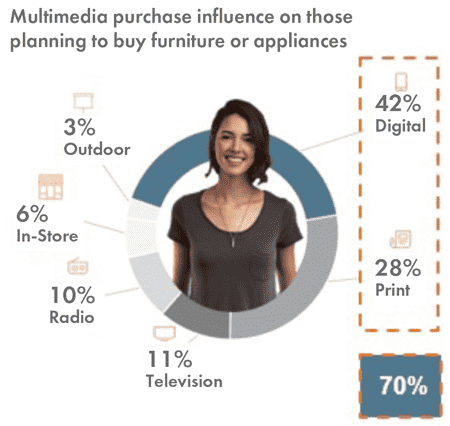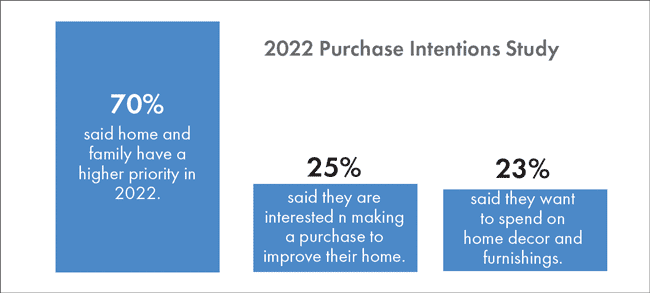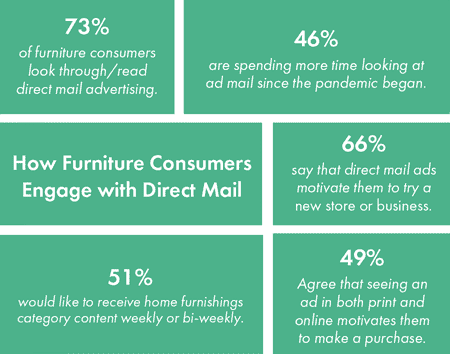Interview with Chip West
Research shows
that more diversification in media buys can be beneficial for many
furniture retailers.
For this installment in Furniture World’s series on advertising best
practices, we interviewed Chip West, director of category strategy for
the national sales team at Vericast, a marketing solutions company.
Vericast helps businesses across many industry verticals, including
grocery, consumer packaged goods, restaurant, retail, and financial
services connect with consumers through data, analytics, and a broad
portfolio of digital, print and payment solutions.
“Our company started in the print space,” West explained. “We were and
continue to be the largest shared mail advertiser in the USA. Furniture
and bedding retailers and their ad agencies use our distribution
platform to co-mingle messages in shared packaging targeted to about 70
million households weekly down to the neighborhood level across the
country.
“This covers most DMAs across the country, with content that can be
customized by neighborhoods, and we have access to vast amounts of first
and third-party data, often incorporating unique data from our furniture
retail partners that help us develop targeted approaches to reach their
customers.
“Over time, the platform has evolved with patented technology, including
digital infrastructure to deliver offline and online solutions helping
clients and shoppers connect.”
A Diversified Ad Spend
When asked to share the major advertising deficiencies among furniture
retailers today, West observed that many retailers don’t diversify their
media enough. “Instead,” he said, “they choose to put all their eggs
mostly in one basket. That’s probably not the right approach in today’s
world. Consumers engage with a lot of media throughout the day,
ingesting a huge amount of information online, print, and broadcast. All
this information affects their decisions about which furniture stores to
visit. There’s a lot of data suggesting that the more media a retailer
layers in to connect through multiple media channels, the better the
response is likely to be.”
 70% of purchase influence is driven by print and digital media.
70% of purchase influence is driven by print and digital media.
Consumer Spending For 2022
“Our studies show that 70 percent of consumers agree that spending on
home and family will have an even higher priority in 2022 than in 2021.
Roughly 23 percent said they planned to purchase home decor and
furnishings. Therefore, omni-channel approaches are critical to reaching
out to furniture shoppers.
“When making advertising decisions,” he continued, “it’s important to
consider the difference between engagement and influence. Just because
you may consume a lot of a particular medium doesn’t necessarily mean
you are influenced by it.
“Other studies show what influences consumers when they’re making a
purchase. Prosper Insights & Analytics, a well-known data company,
reported that 70 percent of the media’s influence on those planning to
buy furniture and mattresses comes from print and digital components
(Source: Prosper Insights & Analytics, 2021).
“That statistic suggests furniture retailers whose media investments are
too heavily weighted toward broadcast are likely to sacrifice market
share among consumers already thinking about or shopping for furniture.
“We all know that over the years, newspaper readership has declined.
According to research by Nielsen Scarborough, a company that collects
local and national consumer insights, 74 percent of U.S. households have
not read a newspaper in the past week. However, nearly half of recent
furniture purchasers say that they spend more time with advertising mail
than before the pandemic. Advertising mail is tangible and has longer
shelf life than other media. It makes a lot of sense because buying
furniture is a purchase that requires ideation and research. This is
reflected in sales data from home furnishings retailers collected over
time following the release of a print mailer.
 Source: Vericast Awareness-to-Activation Study, October 2021
Source: Vericast Awareness-to-Activation Study, October 2021
“About half of furniture consumers surveyed say that seeing an ad both
in print and online motivates them to make a purchase. Online intent
signals can identify households in-market to buy furniture. Infusing
digital advertising is a great way to reach them with an additional
touchpoint. So, a strategy of having an always-on approach with digital
combined with print and other media has proven to be a terrific way to
bring in-store traffic and make more sales.”
Retail Messaging
Moving on to ad messaging in light of recent logistics and supply chain
challenges, Chip West mentioned that Vericast is encouraging retailers
to reconsider repeating pre-pandemic advertising messages.
“Retailers who have ample inventory and/or lines made in North America
will have continued success shouting that out. Retailers who have goods
that are in stock or minimally delayed have a distinct advantage worth
promoting. On the other hand, retailers that are not so lucky can focus
on a more limited selection of in-stock items or general messaging that
avoids traditional price/ item advertising.
“In 2021 and beyond, we saw advertisers continue to promote in-store
events and promotions focused during the tax-refund season. Not
everybody files their taxes at the same time, so the most successful
advertising ensures offers are delivered to shoppers at the same time
they get their refunds. That’s because those dollars get spent pretty
quickly.
“Inflation will make financing offers even more important, especially
for millennials who have purchased homes or plan to buy them in the
coming months. They are the largest share of home buyers today at 37
percent. Eighty percent of millennials are likely to make a major
purchase in the next six months. This group typically buys older homes
that need repair or renovation. Financing offers are an excellent way
retailers can get them into stores to buy furniture on an accelerated
timeline. Consider offers featuring home offices and furniture for
family and common, multi-use rooms.
Also, millennials are the largest group of new movers, the biggest
trigger for home furnishing purchases. Unfortunately, many furniture
retailers still don’t emphasize reaching new movers as much as they
should. So, it’s a big opportunity to bring in lots of new business.”
Other Advertising Considerations
West also commented on the following advertising considerations:
-
Website Messaging: Many retailers need to ensure
their websites better reflect the experience customers will have
when they visit their stores. It doesn’t matter what the mismatch
is; consumers want to see these two experiences tied seamlessly
together.
-
Recruiting: More furniture retailers should
consider leveraging their display ads, as appropriate, for
recruitment. This is more important than ever before due to the
current hiring environment.
-
Message Timing: Another important consideration for
advertisers is the timing of advertising offers. When extended
delivery times are a concern, retailers should let shoppers know
that they need to consider moving up their shopping timeline to
increase the chance of receiving goods intended for seasonal use or
in time for an upcoming life event.
-
Additional Timing Issues: Historically, a lot of
furniture stores focus their messaging to promote big three-day
weekends; Presidents’ Day, Labor Day, Memorial Day, Back-to-School,
Back-to-College, Thanksgiving, Christmas and Black Friday weekend.
Although October through December traditionally registers the
strongest sales for home furnishings retailers, it’s fairly
consistent from month to month when we look at the sales trend-line
for the year. Frequent messaging is especially important now to
reach ready-to-buy furniture shoppers as industry sales may be
softening.
There are so many life events that create selling opportunities. Moving
to a new home is a big one, but people need furniture when family
members move in or out, get married, downsize or make home improvements.
Any of these can trigger a need for new furniture. That is why we see
retailers getting better returns when they spread their messaging out
and use greater frequency to motivate consumers year-round.
 Source: Vericast Consumers Studies (Recent Furniture Purchasers)
Source: Vericast Consumers Studies (Recent Furniture Purchasers)
released 2021 Study, October 2021
Questions about the topics covered in this interview can be directed
to Chip West care of
editor@furninfo.com.